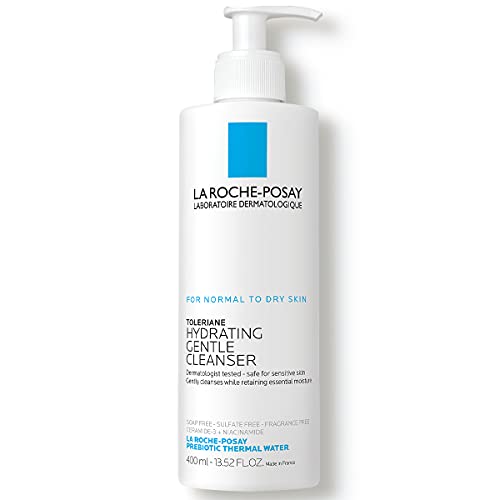The skincare world can feel overwhelming, especially if you have sensitive skin. There are so many products to pick between and many promise to be suitable for sensitive skin, but often fall short. However, with the right approach, you can develop a routine that soothes and protects your skin while avoiding irritation.
In this guide, we’ll provide skincare for sensitive skin tips so you can achieve a healthy, radiant complexion.
Understanding Skincare for Sensitive Skin
Heightened reactions to various stimuli characterize sensitive skin. Items such as skincare products, environmental factors, and even stress can lead to irritation and breakouts.
Common symptoms of sensitive skin include redness, itching, burning, and dryness. While sensitive skin can be frustrating, understanding its triggers and how to manage them is key to maintaining healthy skin.
Identifying Your Skin Type
Before we explore skincare products for sensitive skin and routines, let’s focus on identifying whether you truly have sensitive skin.
Here are some indicators of sensitive skin:
- Frequent Redness: Your skin often looks flushed or blotchy with red spots that can either be smooth or raised.
- Irritation and Discomfort: Products that others use without issue cause burning, itching, or stinging when you apply them to your skin.
- Dryness and Flakiness: Your skin feels tight and is prone to dryness.
- Breakouts: You experience breakouts or rashes when trying new products.
If these symptoms sound familiar, you likely have sensitive skin and can benefit from a customized skincare routine.
Dry Skin vs. Sensitive Skin: What’s the Difference?
Is your skin dry and flaky but also red? Yes, it is possible to have skin that is both dry and sensitive, but these conditions are distinct from each other. Understanding the difference can help you manage your sensitive skincare routine more effectively.
Dry Skin
Dry skin, known as xerosis, happens when the top layer of your skin loses moisture.
The dry skin condition can be caused by various factors, including genetics, environmental conditions like extreme cold or heat, and the use of harsh soaps that strip away natural oils. Frequent hand washing can also contribute to dryness.
Symptoms of Dry Skin:
- Skin tightness
- Mild itching
- Flaking, scaling, and peeling
- Cracks in the skin, which may bleed
While dry skin can be uncomfortable, it is generally not a serious medical issue. However, it can make your skin more sensitive. Yes, dry skin can lead to sensitive skin in some individuals.
In rare cases, persistent dry skin might indicate an underlying health condition, such as hypothyroidism, so it’s important to consult with a doctor if you experience frequent dryness.
Sensitive Skin
Sensitive skin, on the other hand, can result from genetic differences that affect the skin’s natural protective barrier, or from severe irritation that leads to inflammation.
When the skin becomes inflamed, the immune system is overreacting to an irritant or allergen.
Some people are genetically predisposed to sensitive skin, but anyone can develop sensitivity if their skin is exposed to irritants or allergens that trigger inflammation.
By recognizing whether your skin is dry, sensitive, or both, you can better customize your skincare routine to address your specific needs. Remember, in many instances, dry skin goes hand in hand with sensitive skin. You might need to visit your dermatologist to determine which one you suffer from.
What Causes Sensitive Skin?
Sensitive skin can result from a variety of factors, both internal and external. Understanding the root causes can help you manage your skin better and reduce the likelihood of irritation.
Here are some common causes of sensitive skin:
Genetics
Some people are born with a predisposition to sensitive skin. If you have a family history of skin sensitivity or conditions like eczema or rosacea, you may be more likely to experience sensitive skin. Also, fair-skinned individuals often suffer from sensitive skin, especially brought on by sun exposure.
Skin Barrier Disruption
The skin barrier is the outermost layer of your skin that protects against environmental aggressors and retains moisture. When this skin barrier is compromised, it can lead to increased sensitivity and irritation.
Overuse of harsh skincare products, excessive exfoliation, and environmental factors can all disrupt the skin barrier and lead to outbreaks and other skin problems.
Environmental Factors
Exposure to extreme weather conditions, such as cold winds, dry air, or intense heat, can make your skin more sensitive.
Pollution and UV radiation can also worsen skin sensitivity by causing inflammation and weakening the skin barrier.
Chemical Irritants
Ingredients in skincare products, such as fragrances, preservatives, and alcohol, can irritate sensitive skin. Even natural ingredients, like essential oils, can sometimes cause reactions.
Always check product labels and opt for formulations designed for sensitive skin.
Allergies
Allergic reactions to certain substances, including foods, medications, or skincare ingredients, can cause your skin to become red, itchy, and inflamed. If you suspect an allergy, it’s important to identify and avoid the trigger.
Book an appointment with your doctor to discuss your allergy concerns and explore possible options to effectively treat your sensitive skin.
Skin Conditions
Conditions such as eczema, psoriasis, rosacea, and dermatitis can lead to sensitive skin. These conditions often cause the skin to become red, dry, and itchy, requiring specialized care and treatment. With some skin conditions, you’ll need to seek treatment from a dermatologist to correct the problem.
Stress
Psychological stress can impact your skin’s health, leading to increased sensitivity and flare-ups of existing skin conditions. Managing stress through relaxation techniques, exercise, and adequate sleep can help improve your skin’s resilience. Ideally, you should sleep at least eight hours per day.
Diet
Certain foods and beverages, such as spicy foods, alcohol, and caffeine, can trigger skin sensitivity in some individuals. Maintaining a balanced diet and staying hydrated can support overall skin health.
The Mayo Clinic recommends drinking the following amount of water each day to maintain health:
- Men: 15.5 cups (3.7 liters) of fluids a day.
- Women: 11.5 cups (2.7 liters) of fluids a day.
Hormonal Changes
Hormonal fluctuations, such as those occurring during menstruation, pregnancy, or menopause, can affect your skin’s sensitivity. These changes can alter your skin’s oil production and barrier function, making it more prone to irritation.
By identifying and understanding the causes of your sensitive skin, you can customize your skincare routine to address these factors and minimize irritation.
Always consult with a dermatologist if you’re unsure about the underlying causes of your skin sensitivity or if you experience persistent issues.
Essential Tips for Skincare for Sensitive Skin
Let’s explore some tips for skincare for sensitive skin to help you over overcome breakouts and skin problems.
Carry Out a Patch Test New Products
Always perform a patch test before using a new product. Apply a small amount to an inconspicuous area such as on the inside of your wrist or behind your ear. Always wait for at least 24 to 48 hours after application to ensure there is no reaction to the product you are testing.
Simplify Your Routine
Stick to a basic routine with minimal products. You don’t want to pile on the skincare products if you suffer from sensitive skin.
Use only a gentle cleanser, a hydrating moisturizer, and a broad-spectrum sunscreen daily. Avoid complex routines with multiple active ingredients that can irritate your skin.
Choose Fragrance-Free Products
Yes, fragrances can smell great but they can also irritate the skin. Choose skincare products for sensitive skin that are labeled as “fragrance-free” or “unscented” to minimize the risk of irritation.
Look for Soothing Ingredients
Choose ingredients like aloe vera, chamomile, and calendula which all have calming properties that can help soothe sensitive skin. Hyaluronic acid and glycerin are also excellent for hydration without irritation.
Avoid Harsh Exfoliants
Yes, it’s good to exfoliate your skin to encourage cell renewal and unclog pores. However, physical exfoliants with large, rough particles can damage sensitive skin.
Instead, use gentle chemical exfoliants like lactic acid or enzyme-based products, and limit exfoliation to once or twice a week.
Stay Hydrated
Keeping your skin hydrated is crucial. Drink plenty of water and use a hydrating moisturizer to maintain your skin’s barrier function.
Protect Your Skin
Sunscreen is a must for all skin types, but sensitive skin needs products that help prevent further irritation and damage from UV rays.
Choose a mineral sunscreen with zinc oxide or titanium dioxide, which are less likely to cause reactions.
Recommended Skincare Products for Sensitive Skin
Cleansers
CeraVe Hydrating Cleanser: This gentle cleanser contains ceramides and hyaluronic acid to help restore the skin’s natural barrier and retain moisture without stripping your skin.
La Roche-Posay Toleriane Hydrating Gentle Cleanser: Formulated with prebiotic thermal water, this cleanser is designed to soothe and hydrate sensitive skin while effectively removing dirt and makeup.
|
3.5
|
3.5
|
|
$15.48
|
$17.99
|
Moisturizers
Aveeno Calm and Restore Moisturizer: With soothing feverfew extract, this moisturizer helps reduce redness and calm irritated skin. It also contains SPF 15 for daily sun protection.
Eucerin Redness Relief Night Creme: This calming night cream contains licorice extract to soothe redness and provide moisture, helping to restore the skin overnight.
|
3.5
|
3.5
|
|
$16.33
|
N/A
|
Sunscreens
EltaMD UV Clear Broad-Spectrum SPF 46: This mineral-based sunscreen is formulated with niacinamide to calm sensitive skin while providing excellent sun protection without clogging pores.
Neutrogena Ultra Sheer Dry Touch SPF 50: With pure mineral ingredients, this sunscreen offers high protection and is designed for all skin types, including sensitive skin.
|
3.5
|
3.5
|
|
$43.00
|
$12.10
|
Serums and Treatments
The Ordinary Hyaluronic Acid 2% + B5: A hydrating serum that helps retain moisture in the skin, making it plump and smooth without irritation.
Paula’s Choice Calm Repairing Serum: This serum contains antioxidants and soothing plant extracts to calm sensitive skin and reduce redness.
|
3.5
|
3.5
|
|
$9.99
|
$45.00
|
Creating a Sensitive Skincare Routine
Establishing a consistent skincare routine is crucial for managing sensitive skin. By carefully selecting sensitive skincare products and following a gentle regimen, you can minimize irritation and keep your skin healthy.
Below, we outline a simple yet effective morning and evening routine, along with additional tips to protect and soothe your sensitive skin.
Morning Routine
- Cleanser: Start with a gentle, hydrating cleanser to remove any impurities from the night.
- Moisturizer: Apply a soothing, fragrance-free moisturizer to hydrate your skin.
- Sunscreen: Finish with a broad-spectrum mineral sunscreen to protect your skin from UV damage.
Evening Routine
- Cleanser: Use your gentle cleanser to remove makeup and the day’s buildup.
- Serum: Apply a hydrating serum to replenish moisture and repair your skin.
- Moisturizer: Finish with a rich, calming moisturizer to nourish your skin overnight.
Additional Tips
- Avoid Hot Water: Use lukewarm water when cleansing your face, as hot water can strip your skin of natural oils and exacerbate sensitivity.
- Pat, Don’t Rub: When drying your face, gently pat your skin with a soft towel instead of rubbing it.
- Monitor Your Diet: Certain foods and beverages can trigger skin reactions. Keep track of your diet and notice if any foods cause flare-ups.
Conclusion
Caring for sensitive skin requires patience and the right approach. By understanding your skin’s needs and using gentle, soothing products, you can maintain a healthy and balanced complexion.
Remember to simplify your routine, avoid potential irritants, and always protect your skin from the sun.
With these tips and recommended skincare products for sensitive skin, you can achieve the radiant, calm skin you desire.
If you have any questions or need personalized advice, consult a dermatologist who can help tailor a skincare routine specifically for your sensitive skin needs.














